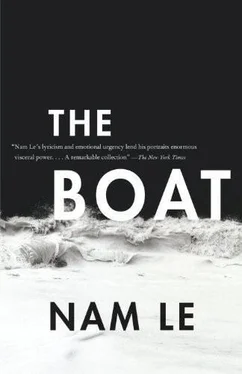" Thoi ," a man's voice interjected.
Mai spun and saw Anh Phuoc in the doorway.
"What's the matter?"
Quyen glared at him. He waited for her to speak. Finally, her tone gone sullen, she said, "She took my son."
He sighed. "Mai was looking after him."
Quyen stared at him, incredulous, then started laughing. She clamped both hands over her mouth. Then, as though in embarrassment, she dipped her head, nuzzling Truong's chest like an animal. Mai watched it all. The thick dense knot back behind her temple. Quyen's body shuddered in tight bursts awhile, then, slowly, hitchingly, it began to calm. It seemed for a moment as though Quyen might never look up again. When she did, her face was utterly blanched of expression.
"Mai wouldn't hurt Truong," said Anh Phuoc tiredly. "She loves him."
Quyen threw him a spent smile. "I know." But she didn't look at Mai. Instead, she turned and again bent over the unconscious shape of her son. That was when she began to cry — silently at first, inside her body, but then, breath by breath, letting out her wail until the whole boat could hear.
***
HE WAS HER SHAME and yet she loved him. What did that make her? She had conceived him when she was young, and passed him off to her aunt in Da Lat to raise, and then she had gotten married. With the war and all its disturbances, she had never gone back to visit him. Worse, she had never told her husband.
"He would leave me," she told Mai. "He will."
But she couldn't abandon her only son — not to the Communists — not if she could find a way out of the country. Even if he didn't want to leave, and even if he didn't know her. Her aunt had balked, and Quyen had been forced to abduct him. She'd been wrong to have him — she knew that — but she'd been even more wrong to give him away. Surely, she thought, she was right to take him with her. Then, when she saw him weakening-then falling sick-she realized that perhaps he was being punished for her shame. Whether he lived or died- perhaps it wasn 't for her to decide.
She begged Mai to forgive her.
Mai didn't say anything.
"He doesn't love his own mother," said Quyen.
"That's not true."
Quyen leaned down and unstuck his hair from his forehead, and parted it. They'd moved him back down into the hold, under the companionway stairs, for shade.
Quyen sniffed. "It's fair. What kind of mother watches that happen to her only son-and does nothing?"
"You were sick."
Quyen turned to her with a strange, shy expression, then lowered her gaze.
"I knew you would take care of him," she said.
"Of course."
"No." She looked down at her son's fevered face. "Forgive me. It was more than that. My thoughts were mad." She gave out a noise like a hollow chuckle. "I thought of asking you…" she said. "I was going to ask you to take him in-to pretend he was your son." She shook her head in wonderment. "He likes you so much. Yes. I thought — just until I could tell my husband the truth."
Mai remained quiet, her mind turbulent.
Quyen sniffed again. " Thoi ," she declared. "Enough!" Caressing her forearm-still scored with rope marks from the storm six days ago — she smiled into the air. "It's my fault."
"Chi."
"Whatever happens to him."
Mai stared down, unsteadily, at the marred, exposed field of Truong's face.
"You don't have to answer," Quyen continued in her bright voice. "Whatever happens, I deserve it."
***
HE ENTERED INTO THE WORST of it that afternoon, moving fitfully into and out of sleep. His breath short, irregular. Their neighbors kindly made some space for him to lie down. When some children came to visit, Quyen rebuffed them without even looking. Mai sat silently opposite them, next to the old betel-gummed woman, transfixed by her friend's intensity.
Then, at the end of the afternoon — after five long hours — Truong's small body suddenly unclenched and his breath eased. The lines on his forehead cleared. It seemed, unbelievably, that he had prevailed.
"It's over," Mai said joyfully. "Chi, the fever has broken."
Quyen cradled him in her lap, rocking him lightly. "Yes, yes, yes, yes," she sighed, "Sleep, my beloved." His clothes were soaked with sweat. For a fleeting moment, as Mai saw his face unfastened from its distress, the fantasy crossed her mind that he was dead. She shook it off. Quyen's hair fell over her son's face. They both appeared to her strangely now, as if at an increasing remove, as if she were trying to hold them in view through the stained, swaying window of a bus.
Truong hiccuped, opened his eyes and rasped, "Ma has some water?" With an almost inaudible moan Quyen hunched over and showered his brow with kisses. Outside the evening was falling, the last of the light sallow on his skin. After a while Truong gathered his breath again.
"Ma will sing to Child?"
"Sing for the poor child," said the old woman.
Quyen nodded. She started singing: a Southern lullaby Mai hadn't heard for years, her voice more tender than Mai had imagined it could be.
Truong shook his head weakly. "No — not that one." He made an effort to swallow. "My favorite song."
"Your favorite song," repeated Quyen. She bit her lip, frowning, then swung around mutely, strickenly, to Mai.
Mai reached out to stroke Truong's hair. She said, "But Child must sleep, nha ?” She waited for him to completely shut his eyes. Quyen found her hand and held it. Mai cleared her throat, then, surprised to find her voice even lower, hoarser than Quyen's, she started singing:
I am the vigil moon that sheds you light
My soul abides within the Thousand Peaks;
Where drunk with wine and Long-Tuyen sword you seek
And slaughter all the leopards of the night.
And in the steps of Gioi Tu, seize Lau-Lan
And quash the Man-Khe rivers into one.
You wear the scarlet shadow of the sun:
And yet your steed is whiter than my palm…
Abruptly her voice broke off, then she swallowed, picked up the thread of melody again, and sang it through, her voice as hard as Quyen's face was tender, her voice resolute and unwavering, sang it through to the very end.
The old woman nodded to herself.
***
THE NEXT MORNING — the morning of their thirteenth day — a couple of the fishermen sighted land. A swell of excitement, like a weak current, ran through the boat. People looked at one another as though for the first time.
"We made it," someone quietly announced, returning from deck. He paused on the companionway, his head silhouetted against the sunlight. In the glare, Mai couldn't make out his face. He said, "We're safe now." The words deep in his throat.
Quyen and Truong were underneath the stairs. Mai had left them to themselves during the night. Now, with those others strong enough, Mai followed the man above deck. Outside, the dawn sun steeped through her, as though her body were made of paper. Dizziness overwhelmed her when she saw the half-empty deck — had they been so depleted? She thought, with an odd pang, of Truong, his incessant counting. Then she saw the prow, teeming with people, all peering ahead, attitudes stalled in their necks and shoulders. She made her way forward, then spotted, far ahead, the tiny breakers on the reefs, and behind those, the white sand like a bared smile. Birds hanging in midair over the water.
During the night she had come to her decision. Her thoughts starting always with Truong and ending always with her father, upright in his hospital bed, staring at some invisible situation in front of him. A street with its lights turned off. She came into morning feeling a bone-deep ache through her body. The boat would land — they would all land — Mai would write to her family, and wait for them, and then she would look after Truong as if he were her own child. The decision dissolved within her, rose up with the force of joy. She would tell Quyen. She would look after him, completely, unconditionally, and try not to think about the moment when Quyen might ask her to stop.
Читать дальше











